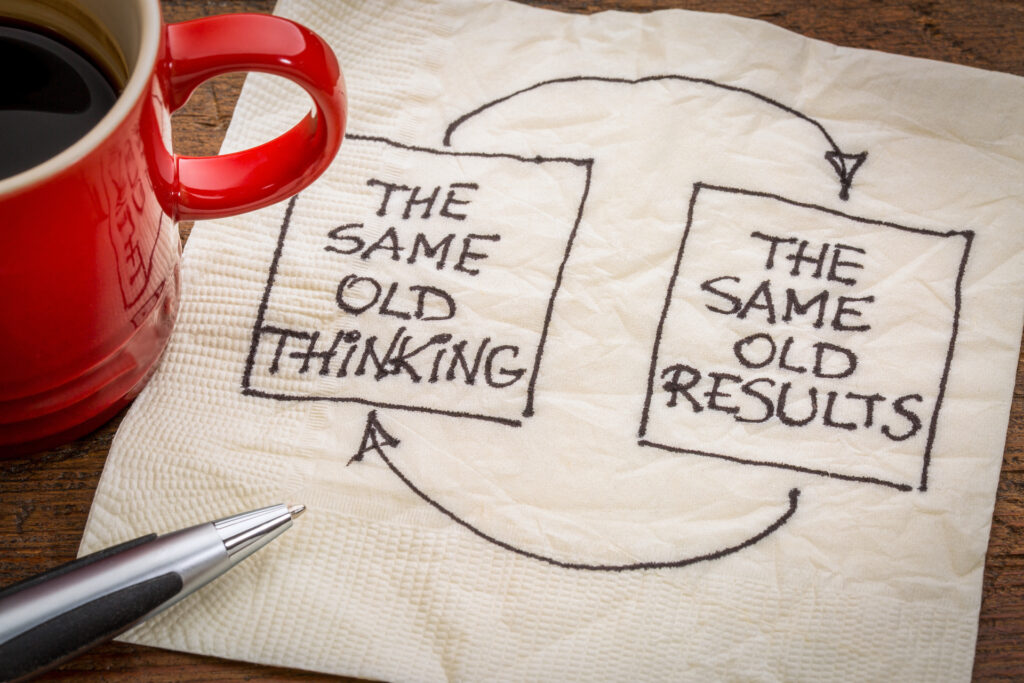According to Dr. Geoff Thompson (Ph.D., CCC), program director at SCHC, people in recovery often describe that there is a link between their stress and substance use.
“When we ask people, we would typically hear something like ‘it’s been such a lousy week at work… I pulled double shifts now plus I’ve gotta deal with my jerk boss… my favourite pet died and I was plunged into this great depression, and I just had to use drugs.’”
Indeed, for decades scientists have recognized that there is a relationship between stress and substance use. At our centres, we observe this relationship at the clinical level, where stress often comes up as a self-professed trigger or motivating factor for substance use. In this article, we examine the relationship between stress and substance use more closely, and find an interesting mitigating factor between the two: our belief system.
Historical Approaches To Stress And Substance Use
Addictions treatment is a science that is constantly evolving. At times, the field has had a large focus on assessing and intervening in people’s stress. Historically, people who were believed to be using substances as a result of stress would be given stressor questionnaires. In essence, these questionnaires would tally up the stressors people face in their lives to determine their likelihood of relapse or recovery.
However, what was found in practice over time was that focusing on stress management techniques and relaxation techniques as a mainstay of treatment and recovery did not lead to significant improvement in terms of ending or reducing problematic substance use. But why?
As research progressed in the field, we began to see that the relationship between stress and drugs is not that straight-forward after all. In fact, there are many other factors that can mediate or moderate this relationship, including genetics, social environment, and personal history. Among these factors is one which is often overlooked, but which we focus on at our centres, as it has consistently proven itself to be one of the most powerful factors to consider: the narratives we hold, based in our belief systems.

The Role Of Belief Systems In Stress Management
Our belief systems are the lens through which we perceive and interpret the world around us. They shape our thoughts, emotions, and behaviours, playing a significant role in how we handle the stress of our daily lives.
Positive and adaptive beliefs can empower us to navigate challenges with resilience, whereas negative beliefs can amplify stress and lead us to coping mechanisms, such as substance use. According to Dr. Thompson, much of the stress we experience is not directly based on objectively stressful experiences, but rather on how we make sense of our experience based on our beliefs.
Of Course I’m Stressed! That @#%&!* Cut Me Off In Traffic!
To illustrate his point, Dr. Thompson invites us to consider what seems like a universal source of frustration: getting cut off in traffic.
“If someone cuts me off, it’s going to create an irritation for me… probably because I believe something along the lines of people who are driving on the road should not cut other people off, and that’s probably my belief system, right? That’s how I make sense of things! So when someone cuts me off, I’m going to react with anger or being irritated or frustrated or whatever right because this is what I believe.”
But according to Dr. Thompson, if we can change our belief systems—i.e. how we make sense of things—then we stand to feel differently when faced with a situation that would normally phase us.
“To take an extreme example, there are countries in the world where the rules of the road are very different… Everybody’s cutting each other off constantly and it’s fine as long as you just honk your horn… no one gets bent out of shape! They don’t get irritated when people cut them off because that’s just how driving works there, right? In other words they’ve changed the belief system.”
The Interplay Between Beliefs And Substance Use
Belief systems can play a significant role in mitigating stress-related substance use by influencing our thoughts, emotions, and behaviours.
For example, believing in the power of exercise, meditation, or seeking social support can make us more likely to turn to these strategies rather than substances when facing stress. Similarly, believing that we have the inner strength to overcome challenges can be key to actually overcoming those challenges.
The things that we value are also very relevant to mitigating stress-related substance use. For example, if we deeply value our health and well-being, we’re less likely to engage in substance use that could harm our physical and mental health. Similarly, if we value self-control and discipline, we’re more likely to want to resist the impulse to use substances as a quick fix for stress.
If our belief system involves religious or spiritual beliefs, we may find solace and support within our communities during stressful times, reducing the need for substance use. Or perhaps our belief systems are not based in religion or spirituality, but simply on purpose and meaning in life, which can reduce the appeal of substance use as a way to fill an emotional void.

Changing Your Belief System – Opportunities For Growth
So, how do we go about changing our perspective on our stressors? This is where changing your belief system comes in. We’ve written about cognitive reframing in two previous blog posts (1, 2). This is a valuable psychological technique that can help individuals better deal with stress and prevent stress-related substance use. By changing the way we perceive and interpret stressors, we can reduce the emotional impact of stress and make it less likely that we will turn to substances as a coping mechanism.
For example, if we believe in personal growth through adversity, we may interpret stressful situations as opportunities for growth rather than as reasons to turn to substances. Instead of viewing stressors as insurmountable obstacles, we can start to see them as challenges to overcome with effort and resilience. This shift in perception can reduce feelings of hopelessness and helplessness, which are common triggers for substance use.
This perspective also encourages problem-solving and diminishes emotional distress, making positive coping strategies like exercise, mindfulness, and seeking support more appealing. Ultimately, this mindset shift promotes long-term well-being by focusing on personal development rather than quick fixes like substance use.

Changing Your Beliefs In Practice
If we want to change the belief systems that are not serving us in times of stress, we can start by identifying negative thought patterns when faced with stressors. We can challenge these thoughts and try to see the potential for personal growth and learning.
Working with a therapist or counselor to develop these skills can also be helpful. At our centres, we make use of a number of different therapies based on changing belief systems, cognitive reframing, and changing the narrative. These therapies provide valuable tools for individuals in substance use and mental health treatment and recovery to reframe their stories, develop resilience, and create more hopeful and optimistic narratives for their future. They include:
1. Narrative Therapy: Exploring and deconstructing the negative narratives individuals hold about themselves and their relationship with substances.
2. Life Storytelling: Guiding individuals to tell their life stories, including their experiences with substance use.
3. Narrative Exposure Therapy (NET): It involves the structured recounting of past experiences, helping individuals process and reframe traumatic events associated with substance use.
4. Autobiographical Sketches and Other Forms of Art Therapy: Creating autobiographical sketches that focus on positive life experiences, talents, and aspirations unrelated to substance use.
5. Personal Myth-Making: Constructing positive personal myths or stories that emphasize their capacity for change and growth. It reframes their self-concept away from being defined solely by substance use.
6. Writing Therapy: Structured writing exercises, such as journaling or letters to oneself, can help individuals process emotions, reflect on their experiences, and gain perspective on their substance use journey.
7. Digital Storytelling: Using multimedia tools, individuals can create digital narratives that incorporate visuals, audio, and text to express their experiences, struggles, and aspirations. This creative process can be cathartic and empowering, and many of our alumni have enjoyed contributing their content to our website.
8. Group Storytelling Circles: Sharing narratives and listening to others’ stories.
9. Metaphor Exploration: Exploring metaphors related to their substance use and recovery.
The Takeaway
Remember that while cognitive reframing can be a powerful tool in stress management and substance use prevention, it is just one part of a comprehensive approach. In many cases, seeking professional help and support is the safest and most effective way to support people who are struggling with addiction and problematic substance use.
At Sunshine Coast Health Centre and Georgia Strait Women’s Clinic, we’re committed to guiding you towards lasting wellness, helping you build a strong foundation from which to end addiction and problematic substance use. We pride ourselves in delivering the best service possible through an approach that recognizes the physical, psychological, social and spiritual aspects of individuals in treatment and recovery. If you or someone you know is struggling with substance use or mental health, give us a call today.



